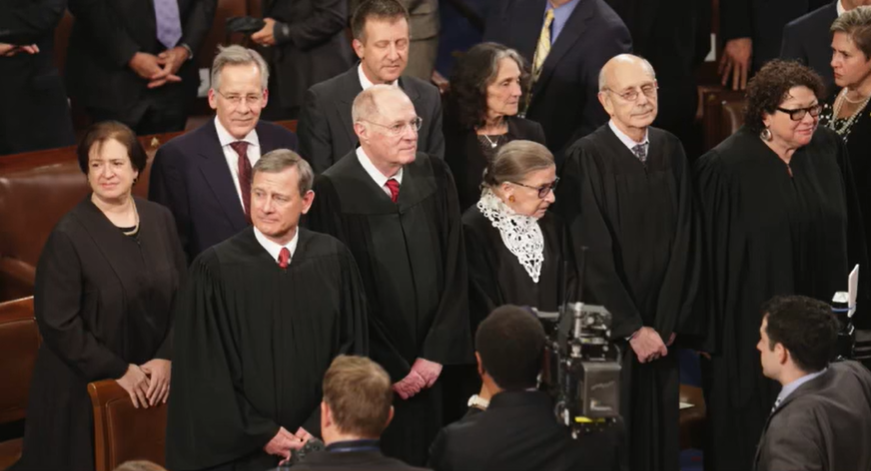Kennedy Praises Supreme Court for Ending Universal Injunctions, Slams Justice Jackson’s “Mad as a Bag of Cats” Dissent
Senator John Kennedy (R-LA) is applauding the Supreme Court’s latest decision to strike down the controversial practice of universal injunctions, calling it a major win for the separation of powers—and taking a direct jab at Justice Ketanji Brown Jackson’s fiery dissent in the process.
The high-profile ruling, authored by Justice Amy Coney Barrett, invalidates the widespread use of nationwide injunctions by lower federal courts to halt executive actions. For Kennedy, the decision was long overdue.
“Judges who just dislike what Congress and a president—any president—has done, just made them up,” Kennedy said in a press briefing. “And good riddance. I’m proud of the Supreme Court.”
Kennedy Goes After Judicial Overreach
Kennedy accused some federal judges of weaponizing injunctions to block policies based on political preferences rather than legal grounds. He argued that the Court’s decision restores a proper constitutional balance.
“If they disagree, you know, I’m sorry. Fill out a hurt feelings report. Buy a comfort rock,” Kennedy quipped. “But they can’t just say, ‘I disagree, and I’m putting the entire action by another branch of government on hold because I don’t like it.’”
The Louisiana senator emphasized that both parties have abused the tool, but said Democrats were the worst offenders. “The Democrats more than the Republicans, but both sides have abused it. And it’s illegal. There’s no basis for it in law. And I’ve just been waiting for the Supreme Court to do this,” Kennedy said, adding that “anybody who knows a law book from an L.L. Bean catalog” would recognize the practice as judicial invention.
Justice Jackson’s Dissent Sparks Reactions
Much of the post-ruling chatter centers on Justice Jackson’s blistering dissent, which framed the Court’s decision as a blow to judicial oversight. Kennedy didn’t hold back when reacting to her opinion:
“It’s a very extensive ruling. You can tell it from Justice Jackson’s dissent,” he said. “She’s mad as a bag of cats, and that’s probably a good thing for the American people.”
Jackson, joined by Justices Sonia Sotomayor and Elena Kagan, argued that limiting injunctions weakens the courts’ ability to rein in executive abuses of power. But Kennedy insists the decision will curb activist judges and return authority to its constitutional limits.
Barrett’s Majority Opinion Hits Back
Justice Barrett’s opinion for the Court strongly echoed Kennedy’s criticisms of judicial overreach. She wrote:
“Some say that the universal injunction ‘give[s] the Judiciary a powerful tool to check the Executive Branch.’ … But federal courts do not exercise general oversight of the Executive Branch; they resolve cases and controversies consistent with the authority Congress has given them.”
Barrett then fired back at Jackson’s claims, accusing her of misconstruing precedent:
“We will not dwell on Justice Jackson’s argument, which is at odds with more than two centuries worth of precedent, not to mention the Constitution itself. We observe only this: Justice Jackson decries an imperial Executive while embracing an imperial Judiciary.”
Her opinion concluded with a pointed reminder: “Everyone, from the President on down, is bound by law. That goes for judges too.”
A Divided Court and a Broader Battle
The decision split the Court along ideological lines and reignited the long-running debate over judicial power. Conservatives argue that nationwide injunctions have been used as a political weapon to thwart presidents—especially Donald Trump—by judges with ideological agendas. Liberals, however, say they are a necessary check on executive overreach.
While the ruling did not directly address the legality of Trump’s executive order on birthright citizenship, it marks a significant win for those who believe in curbing judicial activism. Kennedy said as much:
“The real victory was the Court’s rejection of the illegal practice of universal injunctions,” he explained. “If the left doesn’t like it, well, they can take it up with the Constitution.”
For Kennedy, Justice Jackson’s sharp dissent is proof that the Court got it right. “If she’s furious, then the American people probably won,” he concluded.

James Jenkins is a celebrated Pulitzer Prize-winning author whose work has reshaped the way readers think about social justice and human rights in America. Raised in Atlanta, Georgia, James grew up in a community that instilled in him both resilience and a strong sense of responsibility toward others. After studying political science and creative writing at Howard University, he worked as a journalist covering civil rights issues before dedicating himself fully to fiction. His novels are known for their sharp, empathetic portraits of marginalized communities and for weaving personal stories with broader political realities. Jenkins’s breakout novel, Shadows of Freedom, won national acclaim for its unflinching look at systemic inequality, while his more recent works explore themes of identity, resilience, and the fight for dignity in the face of oppression. Beyond his novels, James is an active public speaker, lecturing at universities and participating in nonprofit initiatives that support literacy and community empowerment. He believes that storytelling is a way to preserve history and inspire change. When not writing, James enjoys jazz music, mentoring young writers, and traveling with his family to explore cultures and stories around the world.









